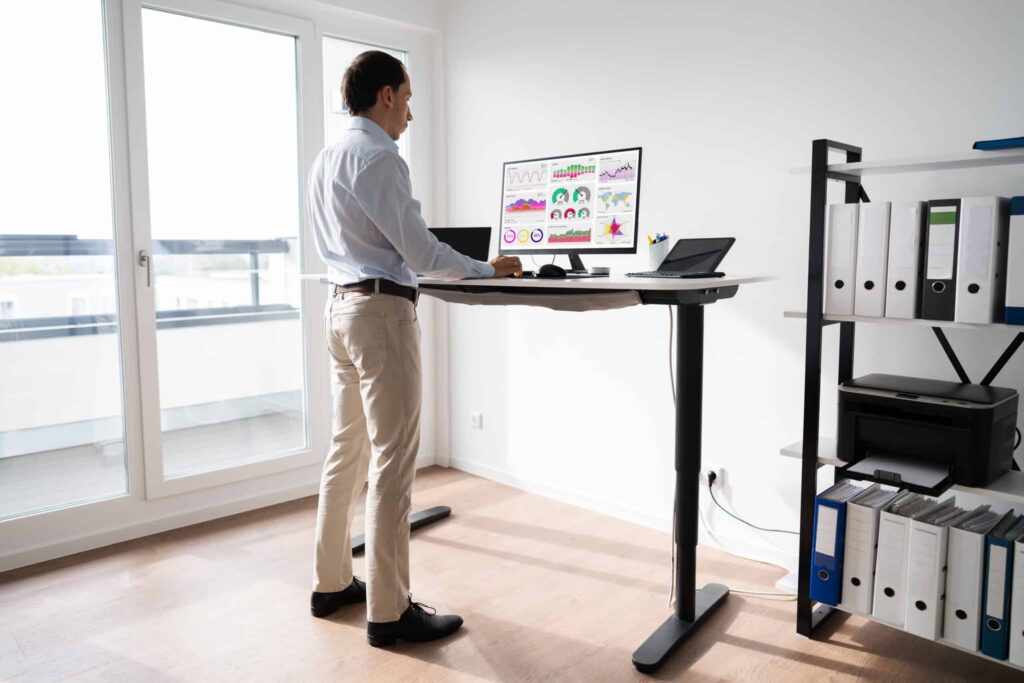In recent years, standing desks have gained popularity as a potential solution to the sedentary lifestyle that many people experience due to long hours spent sitting at work. Standing desks allow users to alternate between sitting and standing positions while working, offering a variety of potential health and productivity benefits. In this comprehensive guide, we will explore seven benefits of using a standing desk and how it can positively impact your health and well-being.
Reduced Risk of Sedentary Behavior
Prolonged sitting has been linked to various health problems, including obesity, cardiovascular disease, and metabolic disorders. Using a standing desk can help reduce sedentary behavior by encouraging users to stand and move more throughout the day. Standing while working promotes blood circulation, engages muscles, and burns more calories compared to sitting, potentially lowering the risk of developing sedentary-related health issues.
Improved Posture and Ergonomics
Sitting for extended periods can lead to poor posture, back pain, and musculoskeletal discomfort. Standing desks can promote better posture and ergonomic alignment by allowing users to adjust the height of their workspace to a comfortable standing position. Proper ergonomics can help alleviate strain on the spine, shoulders, and neck, reducing the risk of chronic pain and injury associated with prolonged sitting.
Increased Energy and Alertness
Standing desks have been shown to boost energy levels and enhance alertness, particularly during the mid-afternoon slump when many people experience a dip in productivity. Standing promotes better blood flow and oxygenation to the brain, leading to improved cognitive function, mental clarity, and focus. The act of standing can also increase movement and engagement, helping users feel more awake and energized throughout the workday.
Enhanced Productivity and Creativity
Standing desks may contribute to increased productivity and creativity by creating a more dynamic and stimulating work environment. Standing encourages greater movement and flexibility, allowing users to shift positions, stretch, and move around while working. This increased mobility can help prevent boredom and mental fatigue, fostering a more dynamic and productive workflow.
Potential Weight Management Benefits
Using a standing desk can support weight management efforts by increasing energy expenditure and promoting a more active lifestyle. Standing burns more calories than sitting, albeit modestly, and may contribute to a higher daily calorie expenditure over time. While standing alone is unlikely to result in significant weight loss, incorporating standing into a balanced lifestyle that includes regular exercise and healthy eating habits can support overall weight management goals.
Lower Risk of Chronic Diseases
Prolonged sitting has been associated with an increased risk of chronic diseases such as obesity, type 2 diabetes, and cardiovascular disease. By reducing sedentary behavior and promoting a more active work environment, standing desks may help lower the risk of developing these health conditions. Standing while working can improve insulin sensitivity, blood sugar regulation, and cardiovascular health, potentially reducing the risk of chronic disease over the long term.
Better Mood and Well-being
Standing desks may have positive effects on mood and overall well-being by promoting physical activity and reducing sedentary behavior. Standing releases endorphins, neurotransmitters that help improve mood, reduce stress, and enhance feelings of well-being. Additionally, the increased movement and engagement associated with using a standing desk can contribute to a more positive work environment and a greater sense of satisfaction and fulfillment.
Conclusion
In conclusion, standing desks offer a variety of potential health and productivity benefits for individuals who spend long hours working at a desk. By reducing sedentary behavior, promoting better posture and ergonomics, and enhancing energy, focus, and creativity, standing desks can positively impact physical and mental well-being. While standing alone is not a panacea for all health problems, incorporating standing into a balanced lifestyle that includes regular movement, exercise, and healthy habits can contribute to overall health and vitality. Whether used occasionally or as a permanent workstation solution, standing desks provide a simple yet effective way to promote a healthier and more active approach to work and life.
- Exploring the Top CBD Edibles A Comprehensive Review By Vapes Super Store - April 9, 2024
- Benefits of Cranberry Supplements - April 2, 2024
- Benefits of Collagen Supplements - April 2, 2024

